

1978年於華岡舉行新舊所長交接典禮,右起周邦道所長、潘維和校長、聖嚴法師、成一法師及李志夫教授。
Master Sheng Yen becomes Director, 1978.
民國67年聖公法師受中華學術院曉峰夫子之聘,方甯書教授和我把聖公法師「抬上」陽明山華岡學園,自此以後,聖公法師就「無事忙中老」,我們內心相當疼惜、懺悔,竟先我們捨報;但他由一介學問僧而終成一代享譽國際的宗教家,我們也與有榮焉。
回憶他接任華岡佛學研究所所長時,提到中國近代佛教教育都是寺院辦的,時斷時續,沒有教育制度,沒有國際觀。即使稍有規模的武昌佛學院、閩南佛學院,乃至抗戰時期的漢藏教理院,存活的時間都很短。
他在日本親眼所看到日本的佛教教育,使他對我國的佛學教育具有更多的理想。我個人也認為在過去的佛教教育最失敗的就是時斷時續,當然就沒有發展的可能。因此,我向法師進言:「我們辦研究所不能被學生淘汰」。意思是我們既定的教育目標是百年大計,不能輕易改變;因為當時就有師生抱怨說我們語文課程太重。
中華佛學研究所的教育是持續華岡時期的教育,同是聖公法師所主持的,從華岡遷到北投也都是原來華岡的師生。雖然聖公一度對華岡佛教教育環境因華岡創辦人的去世而有些失望,但是也因此才有他自己創的「中華佛學研究所」,更有一番新氣象,進而才有現在「法鼓山世界佛教教育園區」的發展。從華岡到北投到法鼓山的佛教學院教育是一脈相傳的,我衷心希望這三大時期的校友也宜組成統一的校友會以壯大校友會的組織與力量。
從民國67年至民國95年這28年中,法師始終半年在台灣,半年在美國弘法,這其間,本所先後不同時期曾由成一長老、方甯書教授、戚肩時將軍、吳寬、惠敏法師、果肇法師及我共同看守門戶。我祇是其中看守門戶最久的人。本所的辦學理念已在法師頒佈的《所訓》中訂定了:「立足中華,放眼世界......」作為本所教育弘規。關於所務行政,即便是法師自己兼任所長時,亦是採「共和制」,所以本所師生同仁原來由個位數,最後發展到70多人,一直是一個和樂融融的大家庭。
聖公主持華岡佛學研究所時,法師返國不久,我陪他拜訪早期佛學界學者。年節前甯書和我也陪他親自到資深法師、居士、學者家中送禮,建立了本所尊師重道的學風。長期以來我的前任方甯書所長與我也都一直遵循聖公法師所建立的成規。
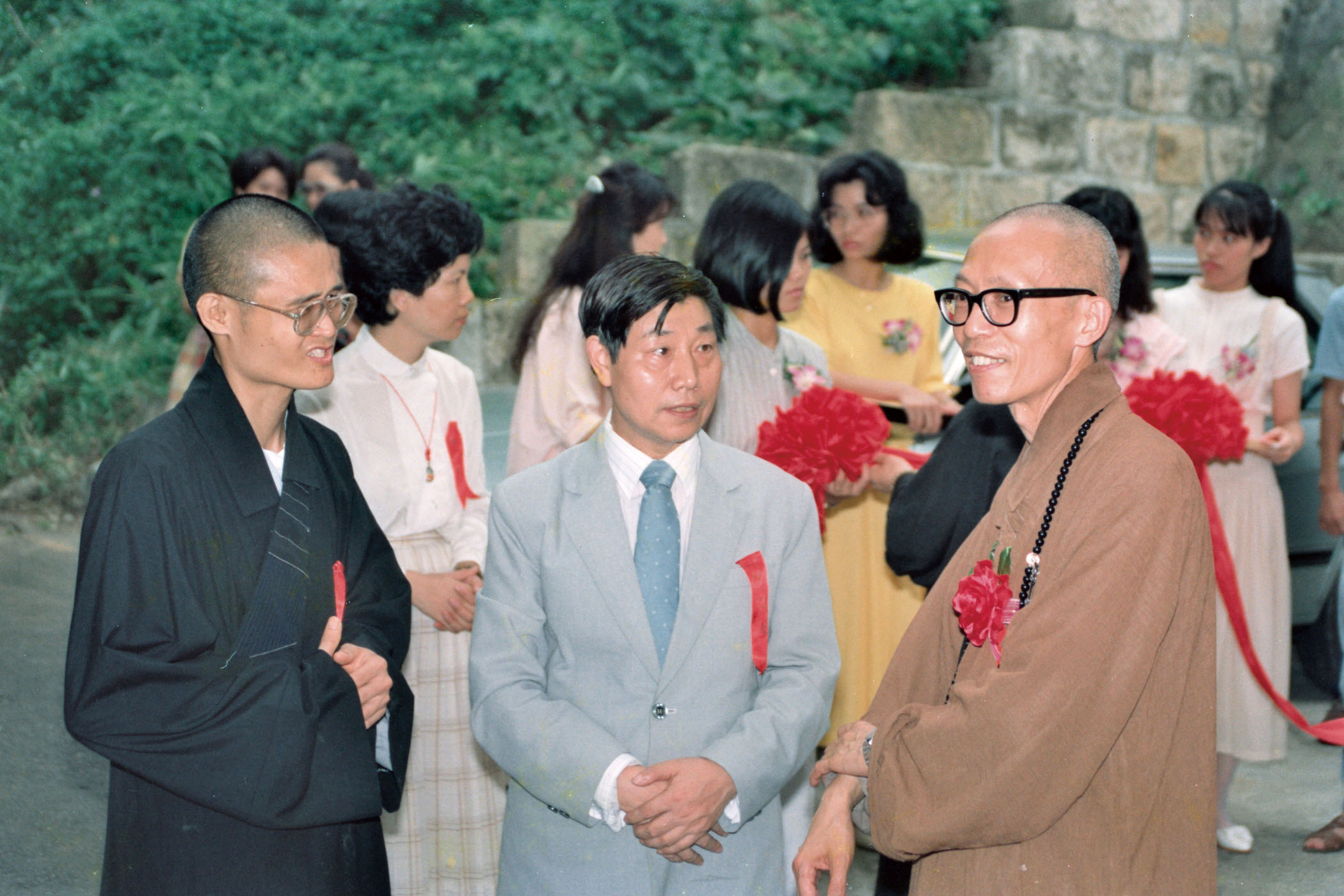
1987年本所獲教育部核准立案,於中華佛教文化館舉行中華佛學研究所成立大會。
CHIBS opening Day in Beitou, 1987.
聖公接掌華岡佛學研究所甫畢,即復刊中輟的《華岡佛學學報》,並開始招生,到了北投創立中華佛學研究所,學生食、宿均免費,每個月並發放研究補助費,由兩千、三千到五千;創刊《中華佛學學報》;獎助優秀博碩士論文出版、特約學者專著,出版《佛學論叢》。這些成就是本所能獲得國科會列入獎助單位的重要因素。
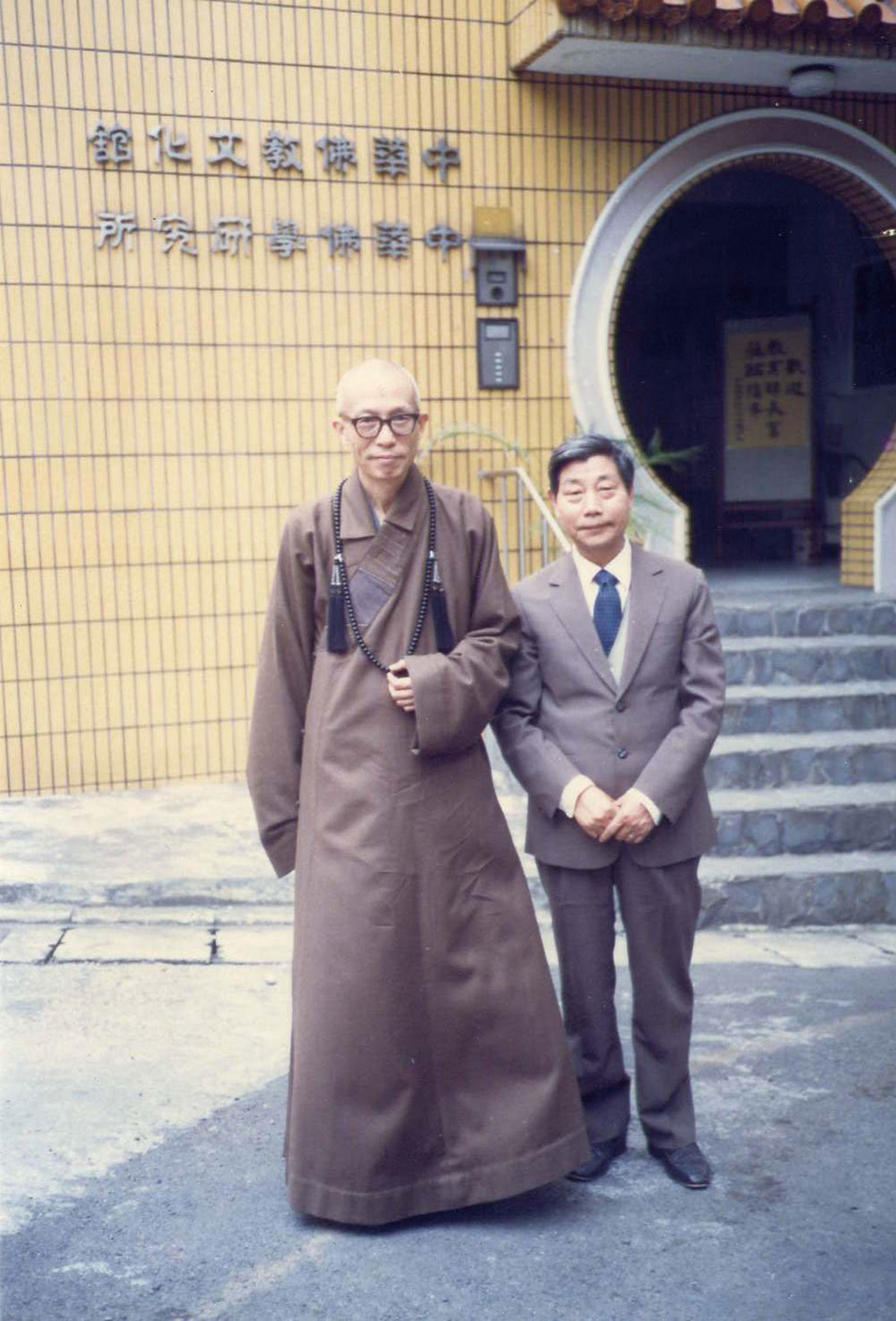
從1968年結識聖嚴法師至今,兩人的情誼已超過四十年。
Master Sheng Yen and Prof. Lee Chih-fu had known each other since 1968.
回過頭來再談一下本所的所訓,是「立足中華,放眼世界」,所以本所對於佛教語言、國際通用英文、佛教實用日語的教育是堅持到底的。因為學生有了多種語言的工具,爾後才能掌握更多文獻,充實佛學研究。而聖公為了鼓勵學生出國,開拓視野,提供有百分之八十以上的獎助學金。無意願出國的,大多撰寫漢傳佛教論文。多以高僧傳記、佛教戒律、譯註為主。尤其現任法鼓佛教學院校長惠敏法師、杜副校長,及老師們在本所歷年所作之專案計畫無不與漢傳經典有關。本人自己所獲八次獎助計畫可說都與漢傳佛教有關。
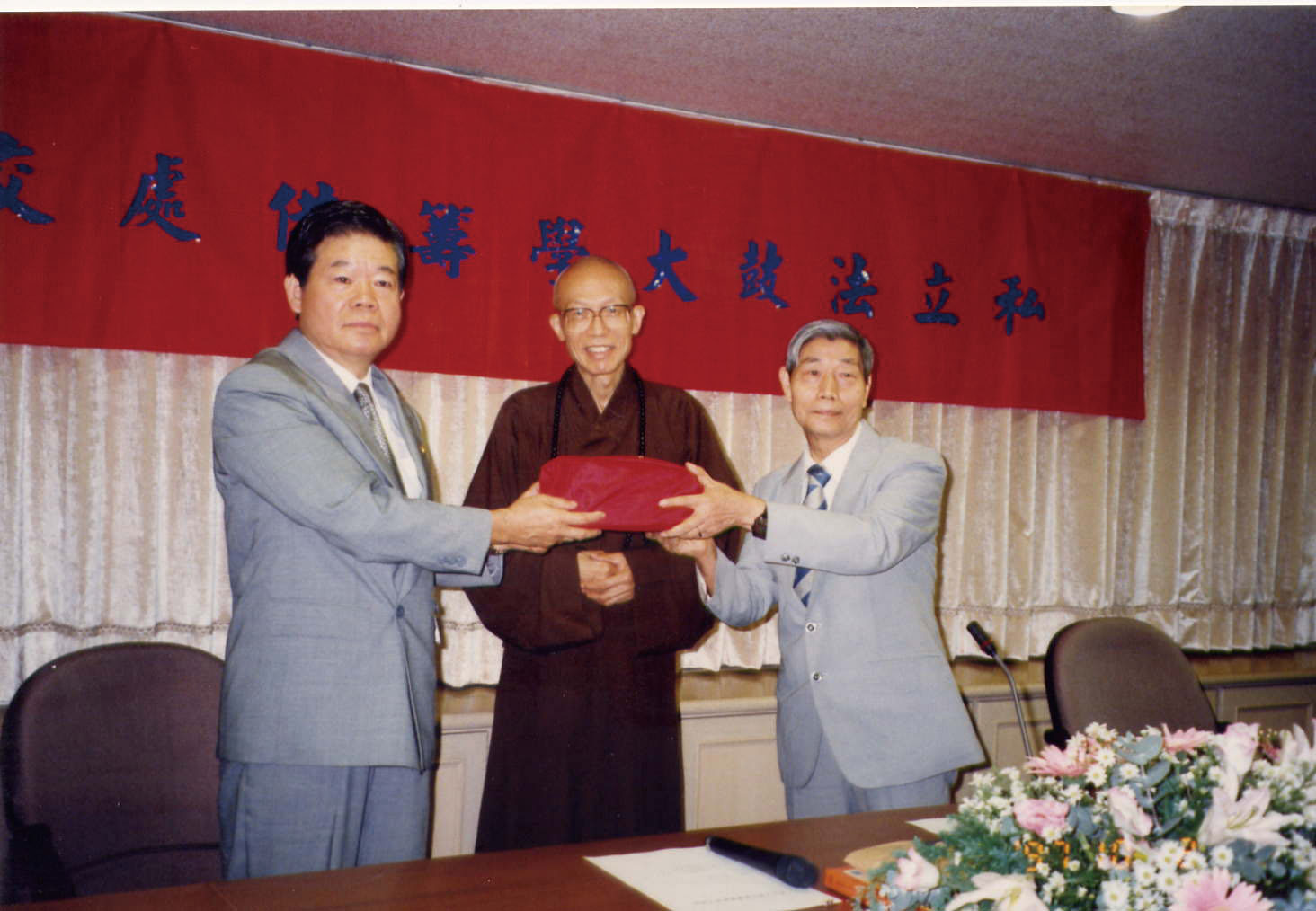
1997年把法鼓大學的籌備工作,交棒給曾濟群校長。
Passing the Seal of Office to Prof. Tseng, 1997.
民國89年研究所由北投遷到法鼓山與僧大同學同宿、同食,我已感到對研究所師生會有影響,因為研究所的學生是以研究為目的,僧大是以培養軌範師為目的,兩者在生活、行儀上高低已判。所以我當時再三勉勵研究所的同學:「要向僧大同學學規矩」。
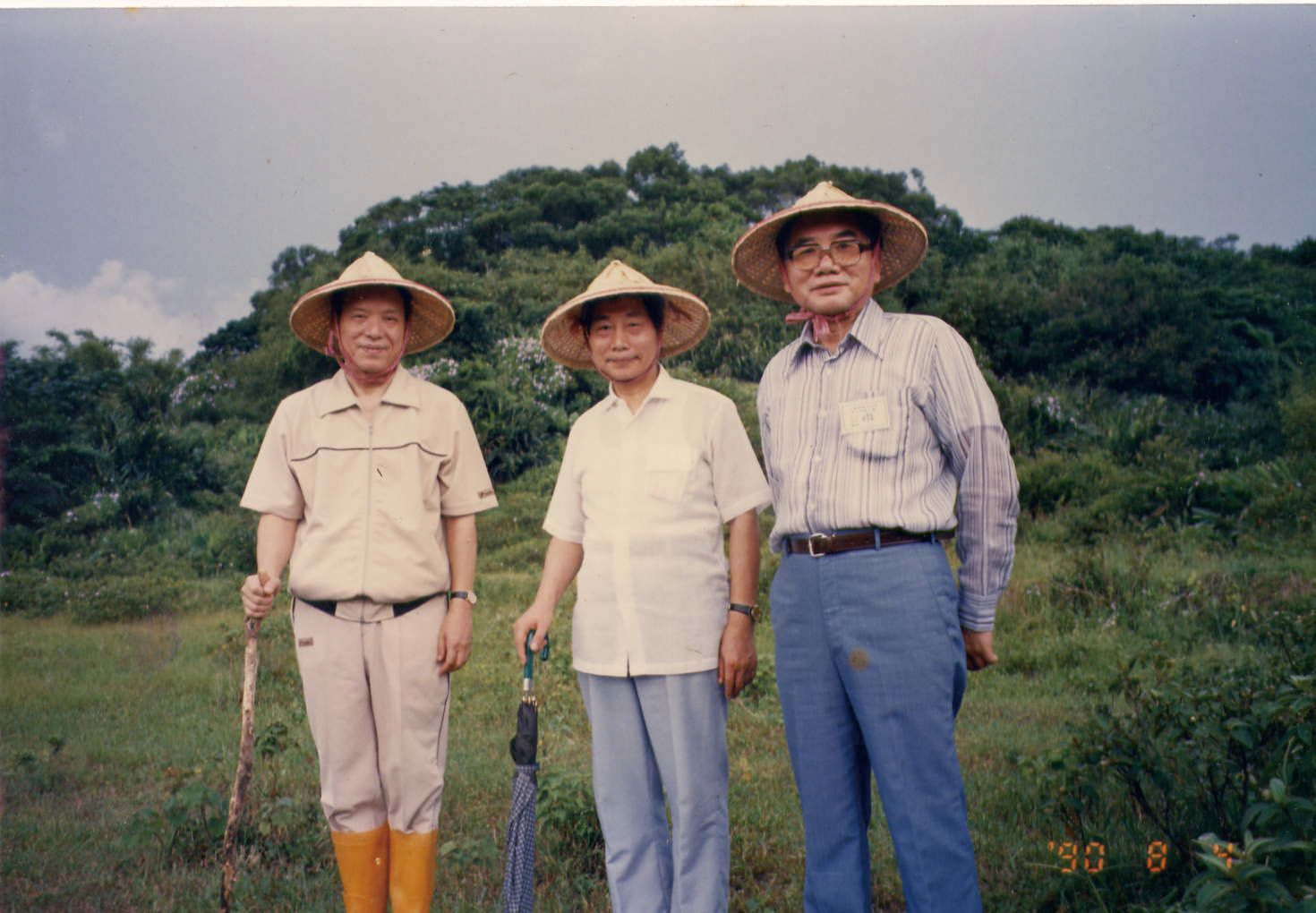
與代理所長方甯書教授、主任秘書戚肩時先生攝於法鼓山。
後來僧大校舍裝修完成,雖然與本所在生活上分開了,但在僧團及悅眾菩薩們的心中已烙下印象,於是聖公法師最近晚年在「創辦人時間」,對研究所多有微詞。我曾向他解釋,胡適之曾說:「要怎麼收穫,就先怎麼栽」。我們研究所要求收獲的,畢竟與僧大是不同的。而且聖公法師的初衷是為中華佛教而辦的教育,心胸寬廣、目標遠大,所以本所也隨著聖公之令譽而日隆。
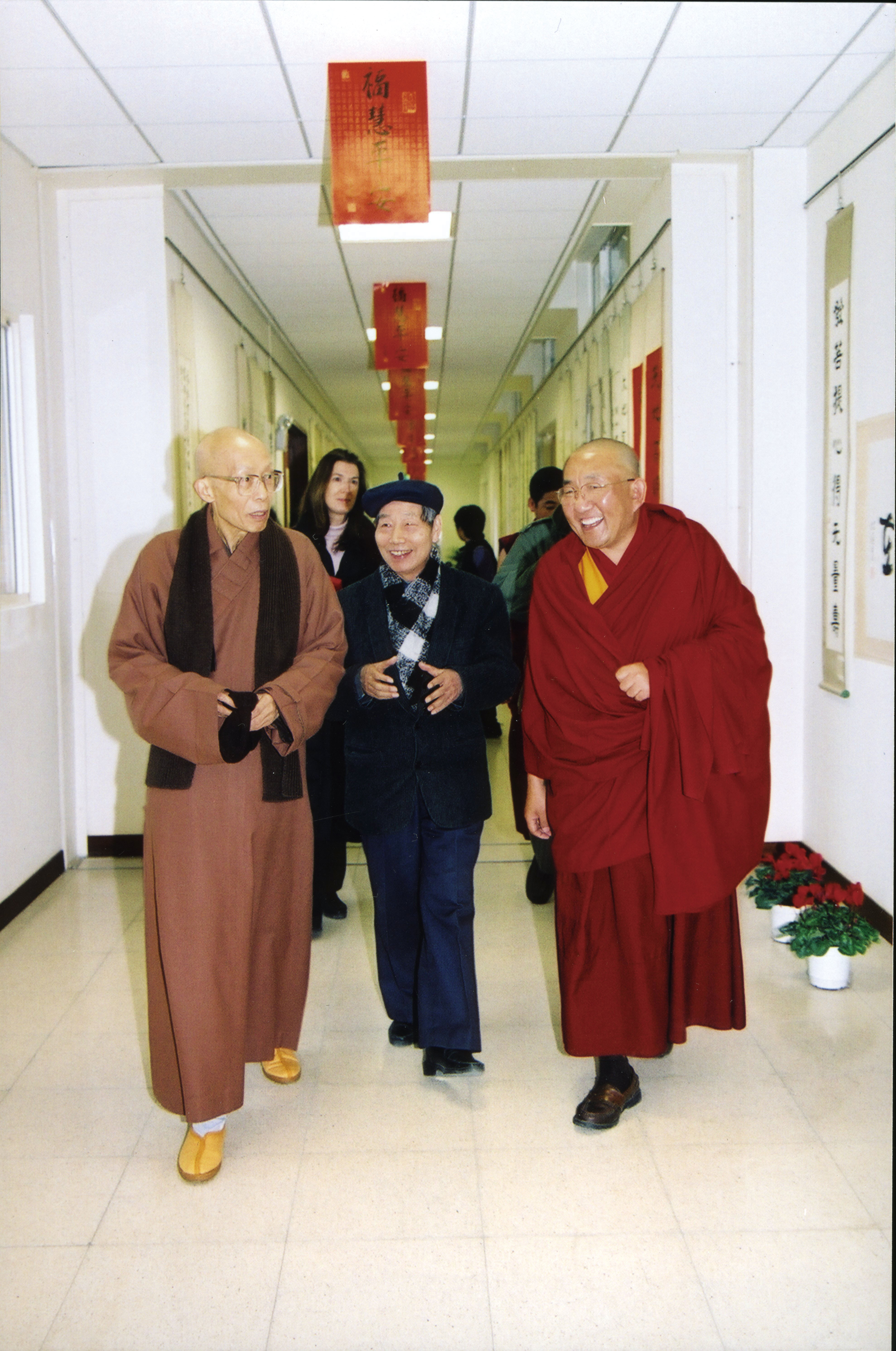
2003年與聖嚴法師一起接待來自美國加州西藏悲智中心的阿嘉仁波切。
With Aja Rinpoche.
就法鼓山整體教育而言,聖公法師對中華佛學研究所所頒的:「立足中華,放眼世界」的所訓,即使放在「法鼓山世界佛教教育園區」,更能點活整個法鼓山的佛教教育精神。
聖公法師以本所為母體先後成立「法鼓人文社會學院」及「法鼓佛教學院」。這兩所學院,本人均曾一度參與籌畫,現在在劉安之及惠敏兩位校長的傑出領導下,一定會是我國高等教育的明日之星,以完成聖公之遺願。
據說岳飛填「滿江紅」一詞時才三十歲,一心要「雪靖康之恥,踏破賀蘭山闕」,因為壯志不得酬,所以浩歎「三十功名塵與土,八千里路雲和月」!我追隨聖公法師三十多年,他自學問僧卒成一代大宗教家,登上宗教高峰,臨風而御。我將岳飛的「浩歎」改了兩個字「三十『工名』塵與土,八千里路雲和月」,這也很適合我個人追隨聖公法師三十多年愧無獻替的寫照。

Upon invitation of Mr. Shiao Feng from Chinese Cultural College, Master Sheng Yen joined the Hua- Gang Buddhist Institute on Yang Ming Mountain in 1978, an opportunity Professor Fang Ning Shu and I helped created. Master Sheng Yen’s days were characterized by busyness ever since. We feel both sadness and regret that he passed away before us. Nevertheless, we’re proud for his accomplishment from being a learned monk to becoming a world-renowned religious figure.
In retrospect, when Master Sheng Yen succeeded the position of director of Hua-Gang Institute of Buddhist Studies, he pointed out that Buddhist education in recent Chinese history was predominantly carried out by monasteries; and it was inconsistent, weak in terms of its educational system, and lacked global vision. Even the stronger, well-organized institutions such as the Wu Chang Buddhist Academy, Ming Nan Buddhist Academy and the Sino-Tibetan Buddhist Institute from the war period were short-lived at best.
Master Sheng Yen’s studying in Japan became a source of inspiration for him, giving him ideas as to how he could help revamp Buddhist education in Taiwan. Historically speaking, I also feel that inconsistency was arguably the biggest failure of Buddhist education — no wonder it never flourished as it could have. In that light, I suggested to Master Sheng Yen that we must ensure our graduate school will not be pushed away by some students over time. In other words, we must establish enduring educational goals and resolve to stand firm by them as we’ve had experiences whereby faculty and students criticized that our curriculum placed too much weight on language courses.
CHIBS, overseen by Master Sheng Yen, inherited the educational system and the faculty and students of the Hua-Gang Institute of Buddhist Studies. Master Sheng Yen was rather disappointed with the way the Hua-Gang Institute of Buddhist Studies was being operated after the passing of its founder, eventually it led him to found CHIBS, thereby breathing new life into Buddhist education, subsequently giving rise to the establishment of the Dharma Drum Mountain World Center for Buddhist Education. The Hua-Gang Institute of Buddhist Studies and CHIBS, despite the changes they have undergone in the past, nevertheless share the same heritage. It is my sincere hope that the alumni of these educational institutes can jointly form an alumni association, for there’s greater power when we unite and join forces.

2007以榮譽所長身份退休,把印信交給新任所長果肇法師。
Passing the Seal of Office to Ven. Guo Zhao, 2007.
To spread the Buddhadharma, Master Sheng Yen divided his time between Taiwan and the US in the 28-year period between 1978 and 2006. In the meantime, Elder Venerable Cheng Yi, Professor Fang Ning Shu, Commander Qi Jian Shi, Mr. Wu Kuan, Venerable Huimin, Venerable Guo Zhao and I each oversaw the daily operations of CHIBS at various times, and I for one took on the task for the longest period. The educational philosophy of CHIBS is precisely as expressed in its school motto, which begins with the line: “Our roots are Chinese, our branches are global.” It also serves as the rule of thumb for the educational regulations implemented at CHIBS. Moreover, we make it a point to abide by the code of harmony Master Sheng Yen established when he became the director of CHIBS, and ever since the faculty and students of the Institute had grown from single digits to 70 plus members, and as always, everyone got along like one big happy family.
Master Sheng Yen had just returned from abroad when he was asked to join the Hua-Gang Institute of Buddhist Studies. I used to accompany him to pay visits to various Buddhist scholars, and Professor Fang Ning Shu and I would also accompany the master to the homes of senior Dharma masters, lay followers and scholars to give Chinese New Year gifts — a gesture of showing our respect to the teachers being a valued tradition at CHIBS. One thing that hasn’t changed in all these years is that my predecessor, Professor Fang Ning Shu and I have always strictly followed the rules established by the late master.
As soon as Master Sheng Yen took over Hua Gang-Institute of Buddhist Studies, he relaunched the publication of the Hua-Gang Buddhist Journal and began recruiting students, followed by his founding of CHIBS in Beitou. Both food and accommodation were provided at no cost to the students; in addition, research grants ranging from NT$2,000 to NT$5,000 were awarded to students on a monthly basis. Furthermore, in addition to the publication of “A Series of Buddhist Studies,’’ CHIBS also distributed the Chinese Buddhist Journal and offered scholarships to outstanding master’s and doctoral students whose thesis papers were published in the Journals. These accomplishments played an important role in making CHIBS a grant recipient of the National Science Council.
Since our school motto is, “Chinese Buddhism is our foundation as we embrace the world,” multilingual ability is a prerequisite for students at CHIBS. It is expected that CHIBS students will familiarize themselves with Buddhist languages and practical Japanese Buddhist terms, as well as to become proficient in the English language; thus, training in these areas became a vital part of education at CHIBS. Furthermore, at the instruction of Master Sheng Yen, CHIBS gave over 4/5 of its students scholarships in an effort to encourage them to study abroad to help broaden their horizons. However, students who did not have the desire to go abroad could instead focus on writing essays on Chinese Buddhism, types of which mainly consisted of biographies of eminent monks, Buddhist precepts, and commentaries on translated works. Over the years, projects that the incumbent President of CHIBS, Master Huimin, Vice President, Mr. Du and faculty members respectively took on have usually been related to Chinese Buddhist canons. I’ve also received grants on eight different occasions for the projects I worked on, which were also on the subject of Chinese Buddhism.
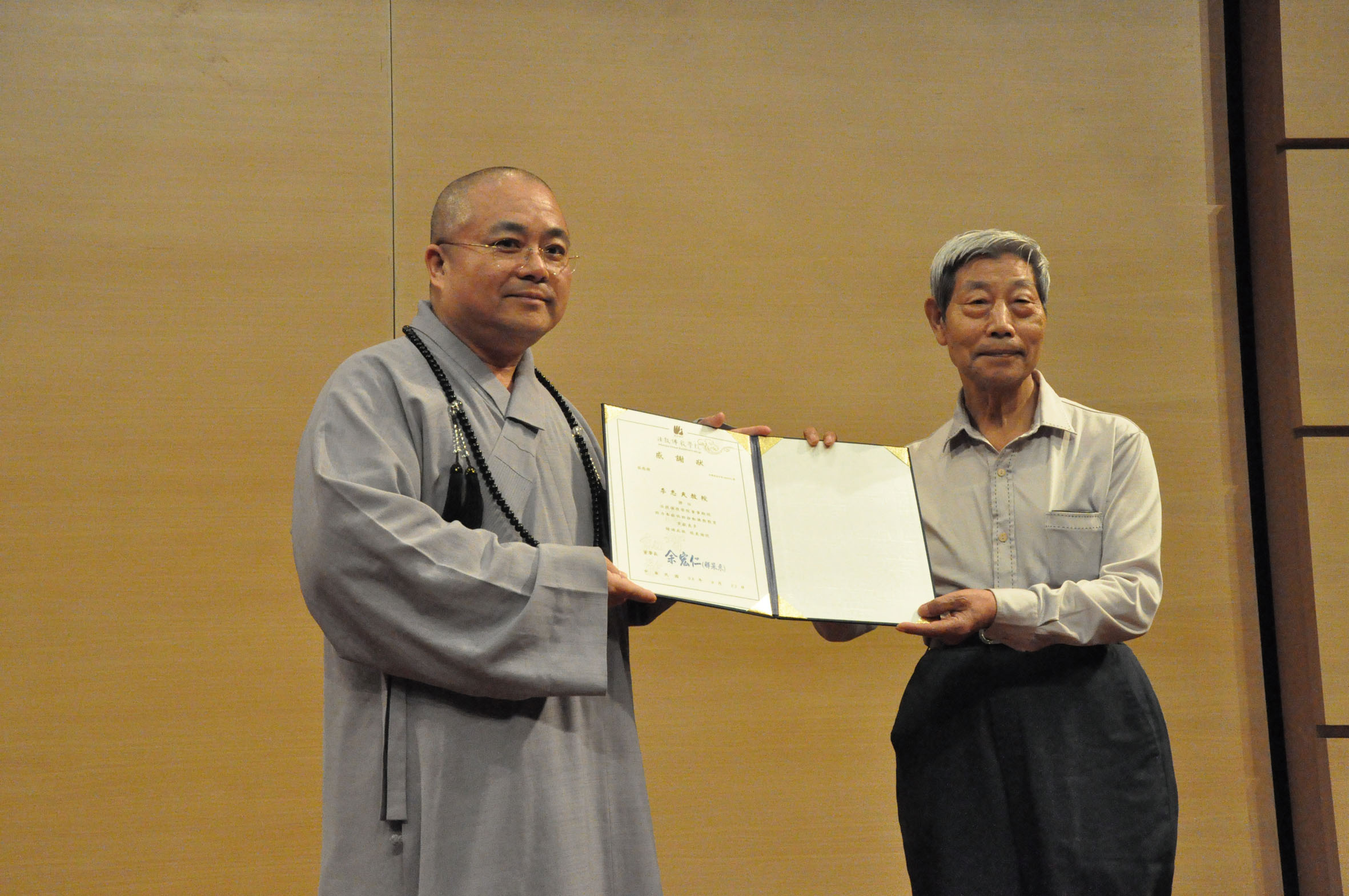
2009年9月由方丈和尚果東法師致贈佛教學院感謝狀。
In appreciation for Prof. Lee Chih-fu’s long services to CHIBS, Sept. 2009.
CHIBS was relocated to Dharma Drum Mountain in 1990, and students lived in the same dorm and dined in the same hall with the students from Sangha University. I felt that this shift in lifestyle would more or less have some impact on the faculty and students as a whole; after all, these two groups of students were being trained for different purposes. One group was concentrating their effort on doing research and the other group was training to become teachers, and so it stands to reason that the students exhibited different kinds of deportment and led different lifestyles. I often urged the students of CHIBS that they should learn from the students at Sangha University to become as disciplined as they were.
The completion of the dormitory’s renovation at Sangha University meant that the two groups of students had to part ways, but the time they spent together nevertheless left an impression on the monastic community and the core disciples. Master Sheng Yen for one, made some comments regarding CHIBS during Founder’s Time in the years before his passing. In response, I quoted Mr. Hu Shi Zhi’s saying of “We reap what we sow,” to explain that we must acknowledge that the two educational institutes are fundamentally founded on different visions and goals. The reason Master Sheng Yen established CHIBS was for the sake of Chinese Buddhism. He had always expressed high hopes for it, and undeniably his aspiration was also what drove its success.
CHIBS’ school motto of “Our roots are Chinese, our branches are global” is also applicable to Dharma Drum Mountain World Center for Buddhist Education as it highlights the spirit of Dharma Drum Mountain.
After the founding of CHIBS, Master Sheng Yen established the Dharma Drum College of Humanities and Social Sciences and Dharma Drum Buddhist College. I assisted with planning. Under the outstanding leadership of the respective Presidents, Mr. Liu An Zhi and Venerable Huimin, I’m confident that these two educational institutes are well on their way to becoming Taiwan’s top institutes of higher education to fulfill the late Master Sheng Yen’s final wishes.
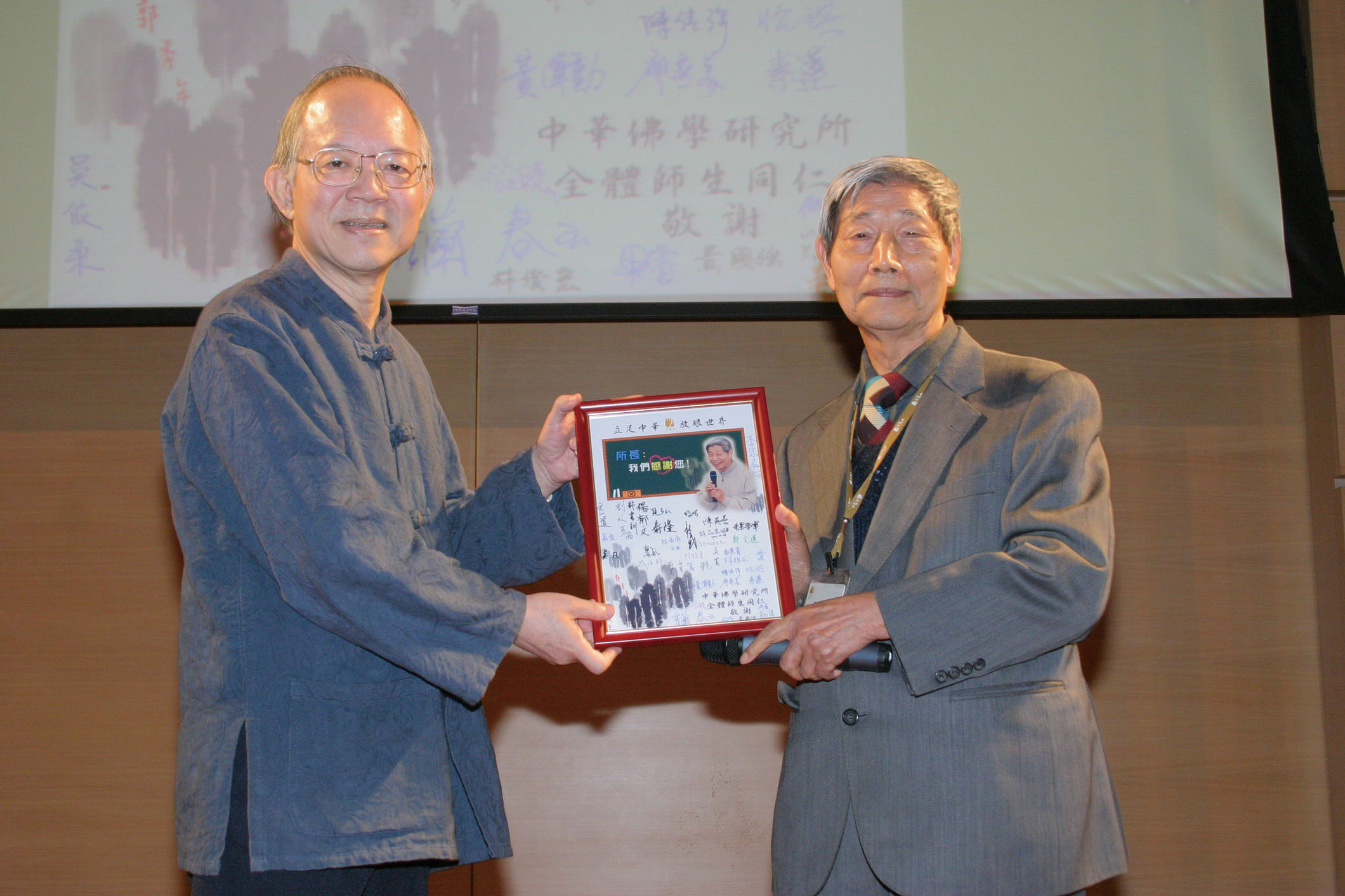
由楊郁文老師代表全體教職員致贈大家的心意:所長,我們感謝您!
Prof. Yang Yu-wen represented the staff of CHIBS to show their gratitude to Prof. Chih-fu.
Yue Fei reportedly was only 30 when he wrote the poem “Man Jiang Hong.” He wanted to redeem the humiliation which occurred in the Jingkang year, yet his dream was never realized. In despair he wrote: “Thirty years have passed and my deeds are nothing but dust, my journey has taken me over eight thousand miles.” In the course of over thirty years that I’d followed Master Sheng Yen, he transformed into a great spiritual figure from being merely a learned monk. I am citing Yue Fei’s poem because it is the perfect portrayal for that period in my life alongside the master; the only difference being that I am deeply humbled for I did not contribute anything of value to him in the time I had.